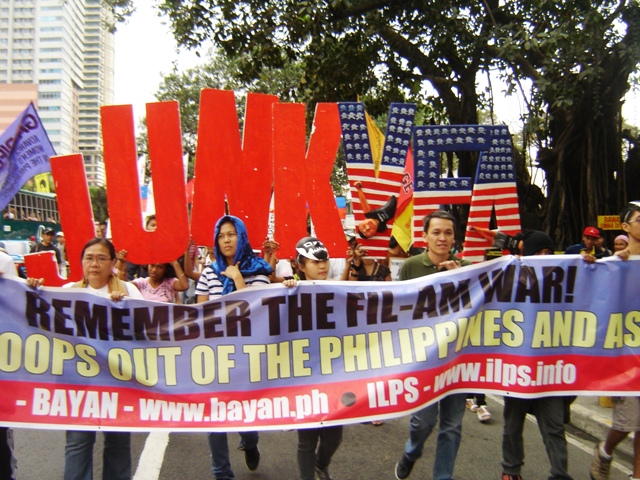What does it take for love to last? Or is there really love in the first place?
The relationship between the Philippines and the United States of America has always been thorny. It is borne not out of love but out of the need to impose control and hegemony by one over the other.
Right from the start, it may even be hardly called friendship. Imagine the US government buying the Philippines from Spanish colonizers at a prize of $20 million. The 1898 Treaty of Paris had defined early on the terms as master and slave.
When Filipino revolutionaries fought for independence, the US government’s “Benevolent Assimilation” massacred hundreds of thousands of Filipinos. The Bells of Balangiga remind us of such atrocities.
When the Japanese invaders came, our guerrillas fought tooth and nail. The US army in the Far East led by Gen. Douglas MacArthur only defended the US geopolitical, economic and military interests against the Japanese.
Fast forward to the Philippines being a US neocolony, or a country not formally annexed but whose national affairs are controlled by the more powerful nation. The Philippine governments after the so-called Independence in 1946 have been subservient to US dictates.
The Visiting Forces Agreement (VFA) and the Mutual Defense Treaty are major manifestations of persistent US intervention. During his 2017 visit to the Philippines, US President Donald Trump admitted how strategic the Philippines is. “And now, we have a very, very strong relationship with the Philippines, which is really important, less so for trade in this case, but for military purposes, it is a strategic location, the most strategic location,” Trump said.
As Foreign Affairs Secretary Teodoro Locsin Jr. transmitted a notice of termination of VFA to the US Embassy in Manila, the Filipino people have no reason to cry. VFA has become synonymous with Filipinas being raped, and with American troops getting away with their crimes. Remember Nicole, Hazel and Jennifer Laude.
The VFA and the Enhanced Defense Cooperation Agreement (EDCA) have not modernized the armed forces. Military training between the troops ensured allegiance to US interests and adoption of counterinsurgency strategies, which have been brutal to the core.
Whatever the motivations of the Duterte administration and however flimsy the reasons might be in terminating the VFA, all freedom-loving Filipinos must rise up to defend our sovereignty and territorial integrity.
Certainly, the most avid supporters, including the so-called American boys (Amboys) in the Armed Forces of the Philippines, will try to lobby for continuous subservience.
We must not wait for 180 days to determine whether or not we should return to this one-sided affair or move on. The Filipino people’s struggle for genuine freedom, dating back to the colonial period, must not be undermined. We must act in honor of our heroes’ blood, sacrifice and patriotism.
Breaking up is not always bad. In this case, it is better for us to be left alone. And that also means not having to enter a more troubling relationship with the US.
In the context of Valentine’s Day, let us remember that moving on from a toxic relationship is better than holding on to an abusive relationship.
The post Getting out of a toxic, one-sided relationship appeared first on Bulatlat.




